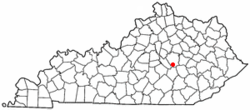Berea, Kentucky
| Berea, Kentucky | |
|---|---|
| City | |

Berea City Hall
|
|
| Nickname(s): The Folk Arts And Crafts Capital Of Kentucky | |
| Motto: "Where Art's Alive" | |
 Location of Berea, Kentucky |
|
| Coordinates: 37°34′37″N 84°17′37″W / 37.57694°N 84.29361°WCoordinates: 37°34′37″N 84°17′37″W / 37.57694°N 84.29361°W | |
| Country | United States |
| State | Kentucky |
| County | Madison |
| Government | |
| • Mayor | Steve Connelly |
| Area | |
| • Total | 9.4 sq mi (24.2 km2) |
| • Land | 9.3 sq mi (24.2 km2) |
| • Water | 0.0 sq mi (0.1 km2) |
| Elevation | 1,024 ft (312 m) |
| Population (2010) | |
| • Total | 13,561 |
| • Density | 1,458.2/sq mi (560.4/km2) |
| Time zone | Eastern (EST) (UTC-5) |
| • Summer (DST) | EDT (UTC-4) |
| ZIP codes | 40403-40404 |
| Area code(s) | 859 |
| FIPS code | 21-05842 |
| GNIS feature ID | 0486894 |
| Website | bereaky.gov |
Berea is a home rule-class city in Madison County, Kentucky, in the United States. The town is best known for its art festivals, historic restaurants and buildings, and as the home to Berea College, a private, liberal arts college. The population was 13,561 at the 2010 census. It is one of the fastest-growing towns in Kentucky, having increased by 27.4% since 2000.
Berea is a principal city of the Richmond−Berea Micropolitan Statistical Area, which includes Madison and Rockcastle counties. It was formally incorporated by the state assembly in 1890.
In 1850 this area, called the Glade, was a community of scattered farms with a racetrack and citizens sympathetic to emancipation. In 1853, rich and politically ambitious Cassius Marcellus Clay gave Reverend John Gregg Fee a free tract of land in the Glade. With local supporters and other abolitionist missionaries from the American Missionary Association, Fee established two churches (First Christian Church and Union Church), a tiny village, and Berea College. Fee named Berea after a biblical town Berea (today Veria) in Macedonia, northern Greece, where the people "received the Word with all readiness of mind."
Founded in 1855, Berea College was the only interracial and coeducational college in the South for nearly forty years. Its motto is "God has made of one blood all peoples of the Earth," a paraphrase of Acts 17:26. Reverend Fee modeled it on Oberlin College in Ohio and hoped it would become an academic beacon to Northern students. Pro-slavery supporters expelled Fee and his followers from Berea in 1859, in the aftermath of John Brown's Raid. Fee had delivered an address at the Pilgrim Church in Brooklyn, New York, in the pulpit of Rev. Henry Ward Beecher. Fee's remarks were reported in the New York Times, but were misrepresented in the Louisville Courier. Subsequently, everyone at the college was given ten days to leave the state. Most lived in Cincinnati or nearby northern towns for several years, returning for good after the war.
...
Wikipedia
